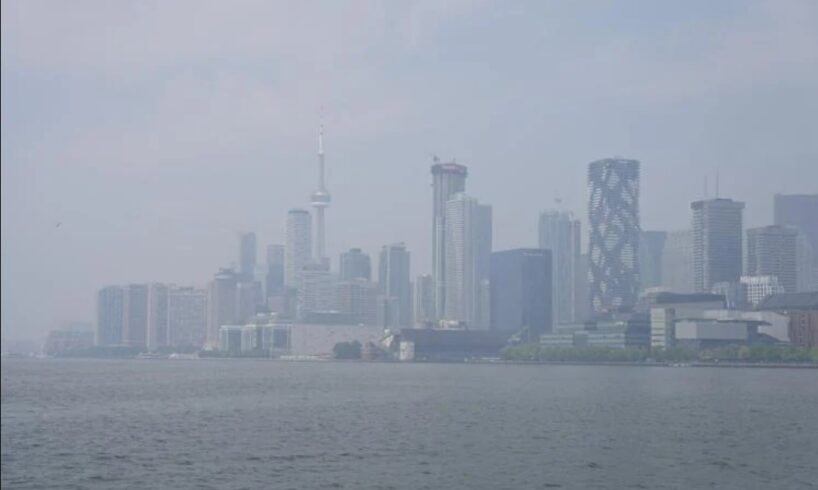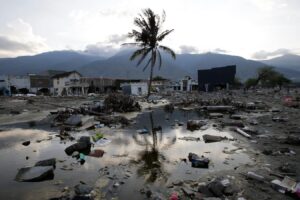
Summer camps and daycares are being forced to shift their plans amid stifling heat and poor air quality caused by wildfire smoke drifting across Central Canada, the Prairies and other parts of the country.
Special air quality statements or warnings were in effect Tuesday for a second day across several provinces and territories, combined with heat warnings that stretched from Ontario to Prince Edward Island.
Smoky air in the Toronto area prompted many camps to field calls from concerned parents and make last-minute changes, especially on Monday, when the city was under a warning due to the Air Quality Health Index reaching the “very high risk” rating of over 10.
Adib Razavi, director of Toronto Athletic Camps, said they received hundreds of calls on Monday morning from parents who wanted to know how their kids’ activities were being adjusted.
“We started getting calls at 5 a.m. and our office opens at 6 a.m.,” he said.
Razavi said many parents requested that their children be transferred to indoor activities, with the camp modifying outdoor activities to take place inside or in shaded areas.
“Whenever we have situations like a heat warning or even a thunderstorm, we’re very hands-on and we understand what the parents need,” he said, adding that the camp also took note of children with asthma and other health conditions.
At Camp Robin Hood, a primarily outdoor day camp in Markham, dozens of kids were absent on Monday, director Howie Grossinger said.
“I think parents are also monitoring those indexes quite closely,” he said, adding that the camp returned to more normal capacity on Tuesday as conditions improved.
The YMCA, which operates a mix of indoor and outdoor day camps across the Greater Toronto Area, said it has been adjusting its programs according to air quality notices and public health advice. That protocol has become familiar since Canada’s record-breaking 2023 wildfire season, said day camps manager Lisa Greer.
“This is not new this year; we’ve experienced this for the last couple of years,” Greer said.
That sentiment was echoed in Quebec, where the province’s camps association said periods of extreme heat and poor air quality “are no longer a novelty.”
“Camps usually know what and how to deal with it,” Association des camps du Québec spokesperson Valérie Desrosiers wrote in an email, adding that the group offers advice to camps on how to adjust activities when needed.
The Ontario Camps Association also said Tuesday that it sent out a reminder at the beginning of the summer about the importance of monitoring air quality alerts and following guidance from officials.
“Every camp is different, and some will have more indoor space than others, but across the board, the health and safety of campers and staff always comes first,” said executive director Joy Levy.
Daycares have also been grappling with how to balance children’s activities and well-being during periods of extreme heat and air pollution.
The executive director of Treetop Children’s Centre in Toronto said such conditions “pose real challenges” for her daycare, which operates out of Oriole Park Junior Public School.
The daycare centre has spent thousands of dollars to install several air-conditioning units, and children were kept inside on Monday with the windows closed and AC on full blast, said Amy O’Neil.
But even as Toronto’s air quality improved to a “moderate risk” on Tuesday, O’Neil said there is “no consensus or consistent direction” from public health authorities on whether it’s safe for kids to be outside.
“We’re kind of being left to our own devices, which is a bit worrisome,” she said in an interview.
With limited air ventilation inside the school building, she said, staying inside all day with the windows closed also poses risks, even with air conditioning and air filters running.
“You can actually feel and smell the smoke inside the school,” she said. “You can’t actually get away from it.”
Toronto Public Health said it provides recommendations but does not offer “specific advice” to child-care centres about closures or outdoor activity restrictions during extreme heat.
“Those decisions are best made by operators that have better knowledge of the needs of the children in their care, and the individual circumstances at their facility,” it said in a statement Tuesday.
Creative Beginnings Early Learning, which offers daycare and summer programs in the Waterloo, Ont., region, has been adjusting the amount of time children spend outside amid extreme heat and smoke, executive director Christa O’Connor said. She plans to add specific directives around air quality as the effects of wildfire smoke become more of a concern.
“We need to start looking at air quality, UV, pollen and all those things, including smoke warnings, so there’s an actual policy in place to protect the children and ensure there are conversations happening,” she said.





